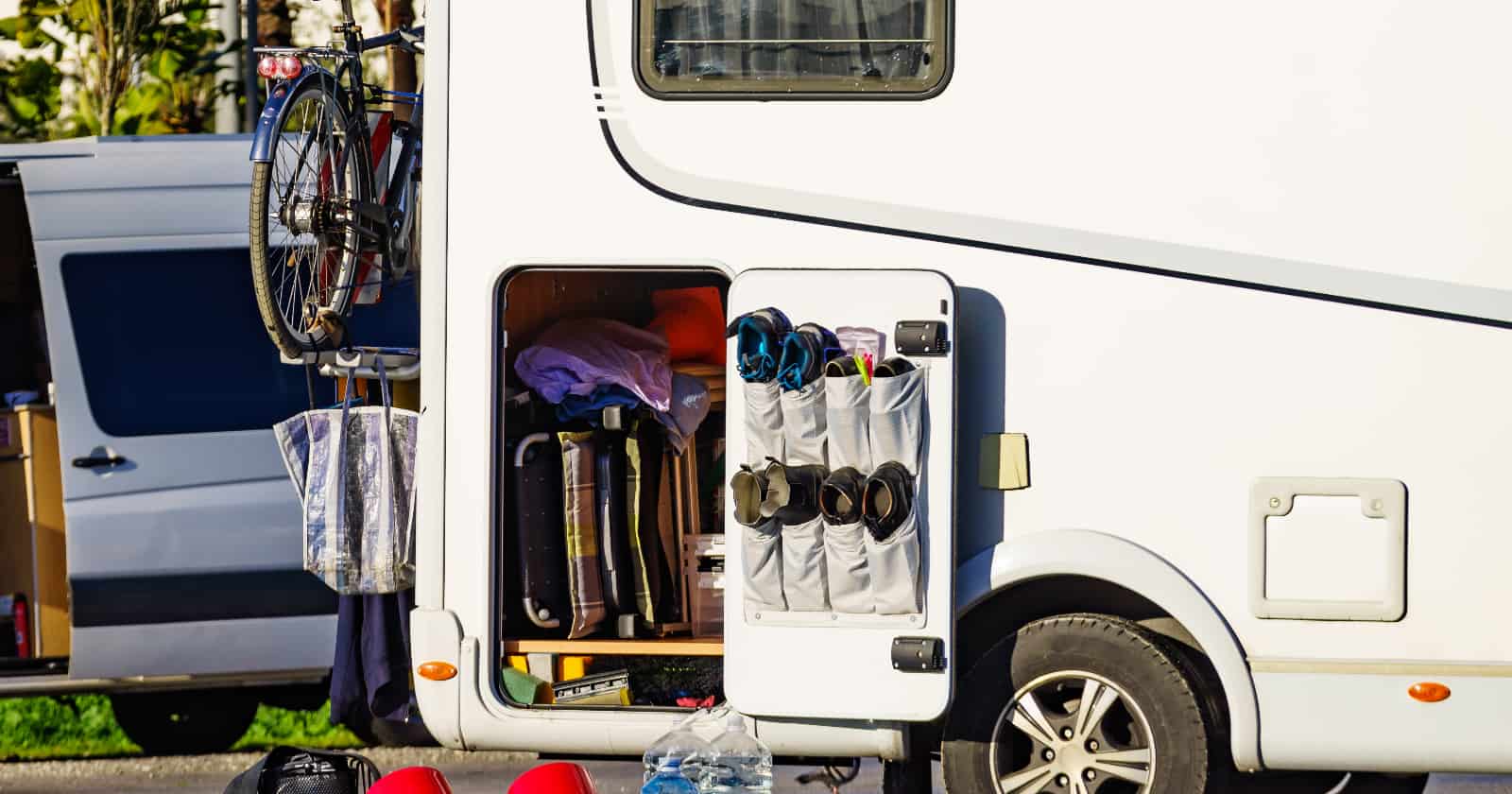You’ve probably heard chatter around the campfire about lithium versus the standard lead-acid batteries for powering your RV. But you might still have questions. So, is it worth switch to an RV lithium battery? We tell you here!
Batteries are an essential part of any RV. Besides being used to start the engine (in your motorhome), batteries are also used to run certain features in your RV. Typically, your 12-volt battery will power your 12-volt lights, furnace ignition, and various other “essential” components. For most rigs, your shore power connection will run your standard plugs.
The most common type of battery found inside RVs (and most vehicles) is the lead-acid battery. These batteries consist of lead plates submerged in an electrolyte solution of water and sulfuric acid, which allow it to store and output electricity. You might think this technology is fairly modern, but in fact, the earliest lead-acid battery dates all the way back to 1859!
Of course, the design has seen many updates and improvements over time, and these days there’s a variety of different kinds of lead-acid batteries available. While they often require some maintenance, lead-acid batteries have long remained the standard in RVs because they’re relatively inexpensive and simple.
However, in the last handful of years, a competing technology has appeared: the RV lithium battery.
What Is A Lithium Battery And How Is It Different?
Lithium RV batteries use metal lithium instead of lead. You’re probably already familiar with lithium battery technology, as it has been the standard type of battery in most consumer electronics for some time now. In fact, the device you’re reading this probably has a lithium battery inside of it!
RV lithium batteries have several advantages over traditional lead-acid batteries
- They can store and output more power, which translates to more electricity for longer periods of time.
- They have a higher energy density than lead-acid batteries as well. This means they can pack the same amount of power into a smaller and lighter package.
- Lithium RV batteries also maintain a higher voltage as they discharge. While a lead-acid battery’s voltage will steadily decrease as it discharges, lithium batteries will output the same voltage until they’re about 80% discharged.
- When an RV lithium battery discharges, it recharges much quicker. In fact, lithium RV batteries charge four times faster than lead-acid batteries!
- RV lithium batteries need less maintenance than many lead-acid batteries, which can require you to add fluid or clean battery terminals.
- The biggest advantage of lithium-ion RV batteries is how long their lifespan is. While a lead-acid battery needs replacing every few years, lithium RV batteries can last 10 years or more!
RV lithium batteries aren’t without some disadvantages
For one, they’re much more expensive than traditional batteries. A traditional battery will cost around $100 to $300, while lithium RV batteries are generally over a thousand dollars each.
However, because of the much longer lifespan of lithium RV batteries, they can save money in the long run. Over the course of a lithium battery’s lifespan, you would have to replace lead-acid batteries many times over. Depending on the batteries you’re buying, you could be looking at thousands of dollars in replacement costs over time!
There are a couple of other downsides to lithium batteries. For one, these batteries can be more dangerous than other types of batteries. Many have heard the stories about cell phones exploding in pockets or electric car batteries going up in flames.
Thankfully, not all lithium batteries are created equal, and in fact, the technology used in RV lithium batteries is very safe. They use a type of lithium battery known as a “lithium iron phosphate battery“. Or more commonly referred to as a LiFePO4 battery. These batteries are more stable than other types of lithium battery and don’t explode or catch on fire in response to hazardous events such as a collision.
To make them even safer, an RV lithium battery will also have a battery management system, or BMS. This system monitors the battery’s condition and manages the current going in and out of the battery. This not only extends the lifespan of the battery but also helps better prevent fires and other hazards.
One final downside of lithium RV batteries is that they do not function as well in cold temperatures. Charging lithium batteries in below-freezing temperatures can cause permanent damage to them. However, there is technology that makes lithium batteries safely usable in freezing temperatures.
Should You Switch Your RV To Lithium Batteries?
Lithium batteries have tons of advantages and they’re a great option for many RVers. Although you’ll have to take on the upfront costs, it can save you money in the long run while delivering tons of benefits. As long as you can afford the costs, switching to lithium RV batteries is highly recommended.
However, there are a few considerations when switching to RV lithium batteries. The first thing to consider is the battery management system. Most batteries will come with a BMS already installed, but some lithium battery options won’t have them and you’ll need to acquire one.
When switching to an RV lithium battery system you might also have to make some changes to your electrical systems. You’ll need to reconfigure your battery charger to work with lithium batteries. If you can’t configure your battery charger for lithium batteries, it may need to be replaced. Solar chargers may also need adjustment or replacement.
Overall, the specifics of switching to RV lithium batteries will depend on your setup. For some, it may be as easy as “dropping in” the battery and doing little to nothing else. Others may need to completely reprogram or replace other components. If you’re worried about doing the installation yourself, you can always have a professional install your new RV lithium battery.
Bottom Line: RV Lithium Batteries Are Completely Worth It
Lithium batteries are the way of the future. They’re already in our phones, computers, and tons of other devices. And more and more, they’re in our RVs!
An RV lithium battery provides tons of power much more efficiently than a traditional battery. They also charge faster, last longer, and weigh less. And while they have a few drawbacks, these can be easily worked around.
It’s not hard to see why more and more people are making the switch to RV lithium batteries. Maybe soon, you’ll make the switch too!





no thank you i had Lithium batteries , Iwill just keep my lead-acid battery
To each their own. We just want to share information.
Consider SiO2 batteries which require none of the hoops that Li wish to have. Good to -40, too.
Awesome! Thanks for the info, Don.
WHATS THE COST? Stupid story— what about the charger, what about fire and explosions of these batteries, some junior high class essay—
Thanks for the feedback, Mark. I’ll take it into consideration.
A post without a datestamp can’t be taken seriously.
Not sure what you mean, Wiley. This article was posted on August 31.
Thanks for the information. I’m trying to make a decision on switching and have been reading everything I can. One critique. Please slow down with the exclamation points!
HAH thanks for your opinion. Batteries are apparently very exciting.
Except you failed to mention recycle-ability. Although there is a recycler …maybe more… which is picking away at recycling bits of cellphones & other electronics…. so far looks to be collecting but not remaking. Lead acid batteries have a very very long history of re-cycling… nearly 98.9 % of the lead & plastic is remade into new batteries.
Think about the huge chunks of real estate needed to create this finite lithium resource.
Very good point!
I’m guessing since they are all 12 volt batteries, those of us using 6 volt batteries will replace half as many. In my case, two batteries rather than four. Now I need to check out if there is a size difference.
Helpful information. I have 6v lead acid deep cycle in my coach and add distilled water as required. I’ve have replaced every 7-8 years and the system has done well for me. I will be replacing next spring on routine service. I have a solar 4 panel 540 watt system with a pure sine inverter.
Robbi Bailor 2000 Monaco Dynasty
I didn’t see in the article a mention to the fact that a lead acid battery cannot be safely discharged more than 50%, while a lithium battery can be discharged safely up to 80%, which means almost twice the usable capacity of the battery bank, therefore reducing the added cost
Excellent point, Angelo. Thanks!
The Lithium battery would need to last ten years to break even. A good chance that prices will come down substantially in the next 10 years! I think I’ll wait to switch!
Definitely an option
On a trailer like mine, a 1969 “Security” brand, my battery is on the front outside so I would worry about theft. A 100 buck loss I could survive but a grand (lithium) would be tough for me
Oh, very true! Thanks for sharing, Kenny!
So… who does she work for, again?
You’ll replace a lead-acid battery approximately every third year. How long is the usual lifecycle in lithium tech? The manufacturers won’t answer that question.
But my experience with my smartphone, my laptop and my camera says, “approximately three years.”
So, it’s totally worth it to spend thousands on lithium every three years or so, versus spending hundreds on lead-acid every three years or so? REALLY?
Worth it to the manufacturers, for sure.
So, who is paying this author to write this stuff?
Hi Ken, unfortunately no battery manufacturer is paying me 🙁 But I appreciate your opinion. As mentioned, lithium batteries have a longer lifecycle which can help offset the initial investment.
There seems to be several good benefits with LiOn batteries, but I don’t think that the financial savings argument is one of them. I can buy two deep cycle flooded, 65 amp/hr batteries for about $140 each, $280. One 125 amp/hr LiOn battery is about $1000. The flooded batteries will last 4-5 years if properly discharged and charged. Thus, over say, eight years I would spend around $600 for the flooded batteries when the $1000 LiOn battery is nearing its end of life.
Great viewpoint!
No, no they are not “completely worth it”.
The cost to benefit ratio is way to high.
Another advantage is much lighter.
But not sure about charger.
Lighter weight is totally an advantage! Thanks for the comment, Larry
Not yet.
Lead Acid batteries can also explode and catch fire which is why they are always placed in a well ventilated are. LiFePO batteries can be placed inside the RV without worrying about accumulating Hydrogen gas during charging (an explosive/fire hazard).
There are other costs associated with lithium batteries that I didn’t see mentioned here. Things like lithium converter/chargers and battery monitoring systems. I have lithium batteries and they have a BMS. But that BMS is to protect the battery not tell me what else is going on. The independent BMS I have lets me know the amps going into and coming out of the battery, how many amp hours have been used and the state of charge of the batteries. Still that SOC is far from perfect. A lithium battery will read almost fully charged until it is almost fully discharged. Not a good situation to be in if relying solely on battery power. Hence the need for an independent battery monitoring system. They are costly and not without limitations. Lithium batteries for RV’s are gaining in popularity but we are a ways off from that perfect world. For the record, I’m not an expert. I’m a user that invested close to $2,000 in lithium before fully understanding the limitations.
All very good points. Thanks for sharing, Gary
Jennifer
Now through 9/13 Costco has Lion UT-1300 100AH batteries on sale for $1400 for two batteries. However, there is also a negative review from someone “Vanlifer” that is somewhat negative on the Costco website.
That’s great information. Thanks for sharing!
I get between 5 to 7 yrs from a set of SLA batteries properly maintained. I probably have another 5 years of rv’ing before I have to call it quits. The next owner of my rig can make the decision to buy Lithiums and a new charger/converter if they want.
Every brand of LiFePo4 battery isnt $1000 You can get some for no more than an AGM battery Shop around once you have lithium you will never regret changing
Lots of different options at different price points.